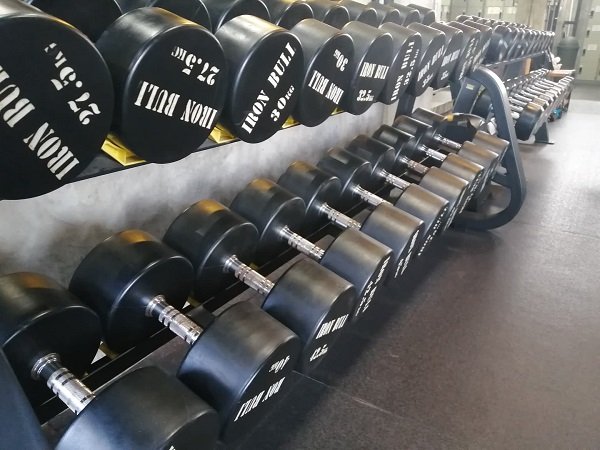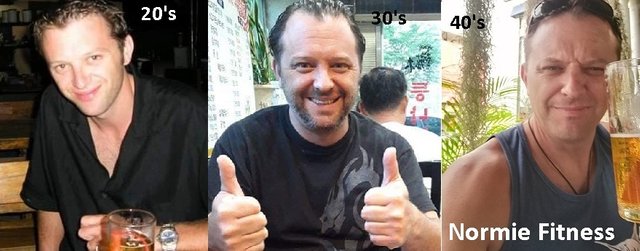Getting older and needing to listen to your body more
I say this as someone that has been athletic most of his life and has gone from a guy that would play 3 full-time football or american football games in a row in my late-teens and early 20's to someone that can barely run a 5k without stopping in his 40's.
Lately, I have been forced, by the limitations of my own age and body to slow down a bit when it comes to fitness and I feel as though there isn't a great deal of real "normie" information out there on the internet. It seems like everyone around my age aspires to be some sort of influencer that is likely on HGH and 'roids, but is going to pretend as though some made up diet and certain supplements enable you do do whatever you want and carry on as if you were still 25.
I'm no elite athlete, but I do exercise every single day, monitor my diet, stretch regularly, and do a mix of weights and cardio that are intentionally meant to achieve balance in life. I sill drink when I want to drink but try to maintain some level of order in my life as far as overdoing it is concerned.

This isn't to say that I am correct about everything though. Much of what I have learned is going to be very different for any particular individual, there is no "one size fits all" in fitness and I think this becomes more profound and noticeable the older that you get. I know that the "turning point" for me, where I became a lot more susceptible to injury was right around the age of 43 or so but I know plenty of other people where it happened much earlier.
I want to say that it goes hand in hand with male-pattern baldness but this also would not be true and all you have to do is look at the number of elite athletes like Andre Agassi and Landon Donovan to make this point as well as a great many professional boxers and mixed martial artists. For me, it was right around the time that I started to lose my hair.
There is no specific age where you will definitely make "the turn" but I think it is important to recognize that your body is starting to need more maintenance in order to perform and as unfair as this sounds. It likely directly coincides with you not having enough time for said maintenance either.

src
For me, that major part of me that I first started to notice that always ached was my knees or the areas around my knees such as the tendons and associated muscles. This was true whenever I did cardio but obviously, not so much when I was doing weight training. There would be days after doing and easy-going 5k that I felt as though my knees were about to explode and this didn't make any sense to me after decades of activity. To be fair to my knees, I took about a 7 year break where I was really irresponsible with my diet after breaking a bone and instead of correcting it right away, I just let myself go. Thus began my 4 year journey of losing more than 60 lbs. It was mostly diet, this much I will admit. But I started to enjoy the exercise even though I was now far more likely to end up injured because of it.
Here are some tips that work for me as far as preventing any long-lasting injury that has worked in my own life.
stretch stretch stretch. Some days I will devote the entire session to just stretching and spend 30 minutes on that. There are a ton of free websites and apps that can help you with exactly this. Stay away from gurus that are just going to sell you some sort of supplement nonsense. There are no known supplements that are going to definitely help with muscle soreness, there are TONS of products that claim to.
If your body is sore, stop trying to do the "no pain, no gain" route. This is a young man's mantra. For adults who do not have access to Liver King's level of drugs and medical care, this is a recipe for disaster. If your body hurts, try to figure out why and alter your workout accordingly. When my knees started acting up after running, I made a genuine effort to stretch a lot afterwards. Prior to this probably evident discovery on my part, I just used to "man up" and deal with it. Again, this is a young man's attitude, and if you are like me, you are not a young man anymore
cold and heat treatments are very effective at nagging soreness. I am not a doctor. I have no background or education in sports medicine. What I do have are tons of friends, many of whom are professional personal trainers and they will always say that alternating hot and cold on a hurt area reduces swelling and helps to, I dunno, just sort things out. Get yourself one of these things

src
get yourself one or two of those things. They only cost a couple of bucks each and at least as far as freezing them is concerned, they seem to last forever. They say you can microwave them but this is a dangerous game in my opinion. The microwave can turn one of these things into danger-lava so I just use running hot water or a hot bath and alternate between the two.
It really does work.
- The last thing I am going to say is that if you experience something that really hurts, like make sleep difficult kind of hurt, at least go to a doctor. Not long ago after rough-housing with some friends in football I thought I had just taken a little bit of a bump on the ground and the next few days I thought I had just "slept wrong" which is something older men do. Turns out I had two bruised ribs and a microfracture... don't get excited, the fracture was embarrassingly tiny. Once I took the advice and used a compress I was over this pain in just a week or so. had i left it to my own devices I probably would have played through the pain in perpetuity. I am just that stubborn but as I get older I find that I am more willing to listen to other people, but only if I know them and they don't have an agenda.
NOTE: Going to the doctor can be something people are very unwilling to do in USA because of the potential of very high medical bills. Our medical system is screwed in USA but if you bother to look in your community, there is a very good chance there is a low-cost clinic or university hospital where people in residency are being taught while you are being looked at. Don't leave it to chance... get it checked out before it becomes something you will have to deal with for the rest of your life.
I don't know why I decided to go on for so long about that this time around. Possibly because I am in proper mid-life crisis mode at the moment. I want to look and feel as good as I can but one thing is for certain, you aren't going to be doing any exercise if you can't move. So put more time into maintenance and perhaps a bit less into trying to replicate what you were capable of 20-30 years ago.

I don't have all the answers and of course I advise everyone to look for non-biased sources that aren't trying to sell you any particular product to get their own information. Most of what I know about fitness was developed over decades, and a lot of this wisdom came from making the wrong choices in that time. Maybe if you read what I talk about, you wont have to make those same mistakes
Absolutely agree with you. I’m 37, I work out at the gym and also go for runs, and I feel the effects of aging too, there’s no escaping that. That’s why I don’t train the way I did when I was 20; I take better care of myself now. Take care of yourself too, and thanks for the article!
Thanks pal. I think that a lot of people keep trying to stay 20, hurt themselves, take a break because of injury, and then just start to lead an unhealthy life and never go back. Just like we need to adapt in our careers as we get older and hopefully more successful, you need to adjust in fitness and slow down a bit. You can still do the things you did when you were 20 and some of them you may actually be able to do better, but we need to stop thinking that our muscles and bones can take all the beatings that we did to them when we were young and fresh.